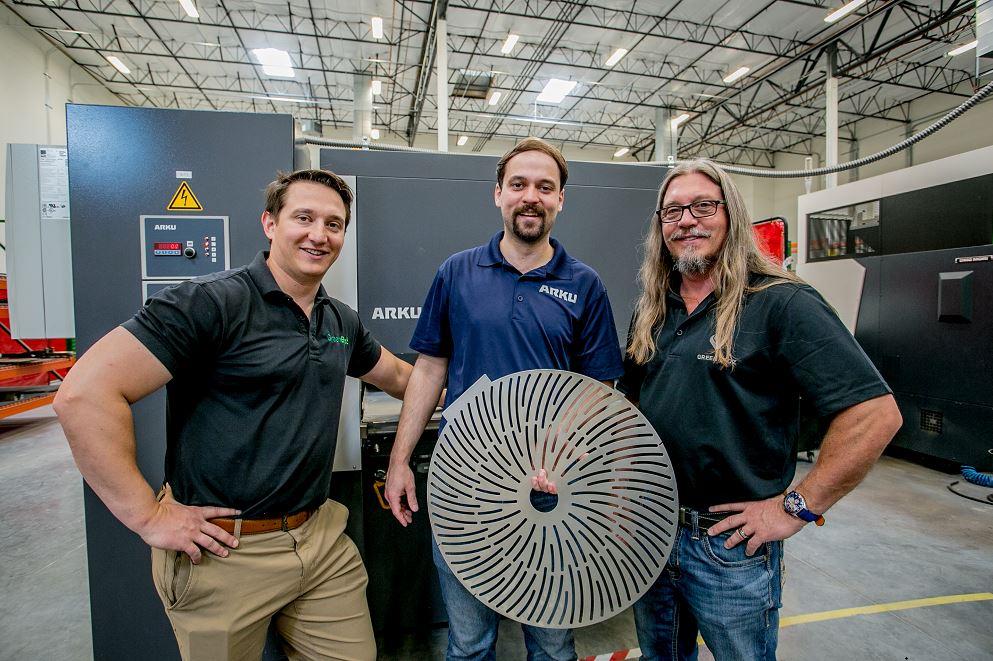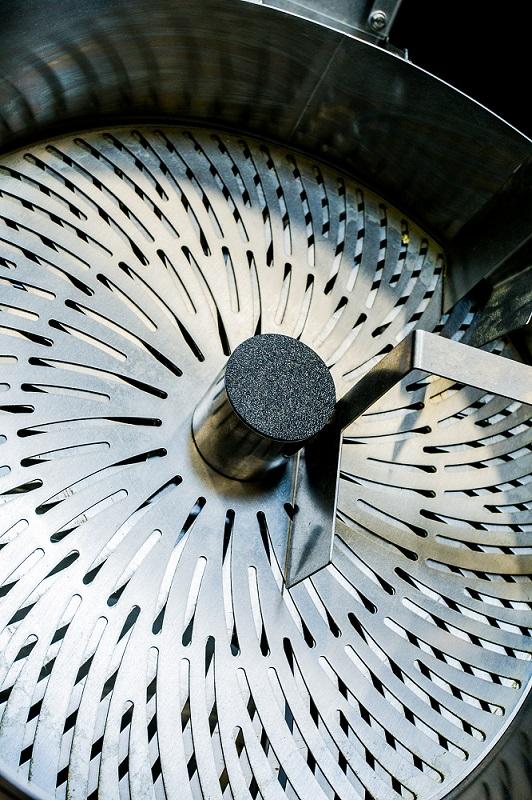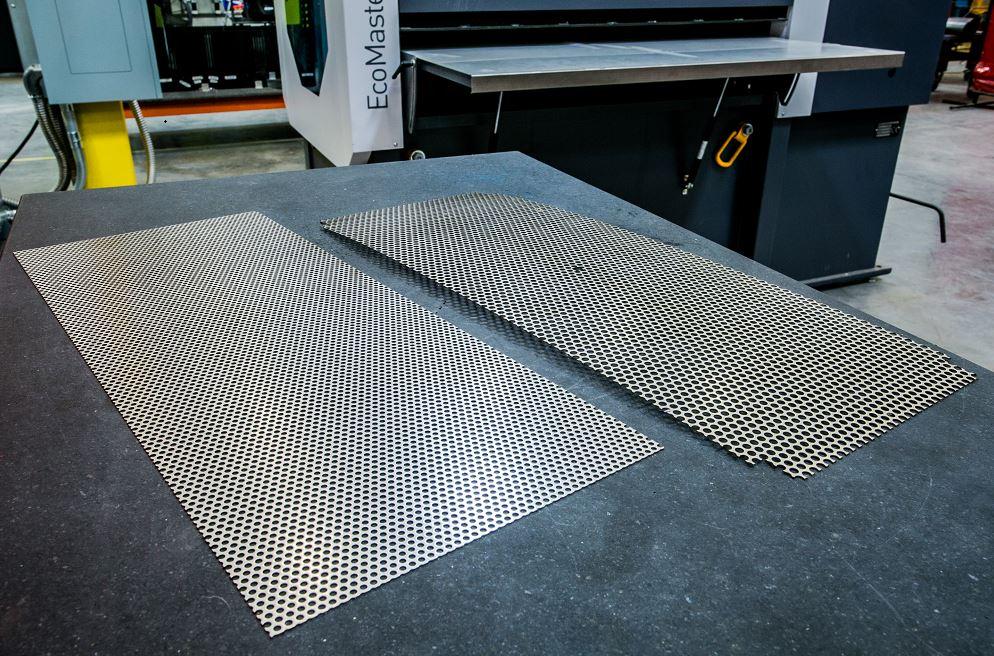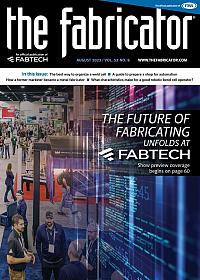Editor-in-Chief
- FMA
- The Fabricator
- FABTECH
- Canadian Metalworking
Categories
- Additive Manufacturing
- Aluminum Welding
- Arc Welding
- Assembly and Joining
- Automation and Robotics
- Bending and Forming
- Consumables
- Cutting and Weld Prep
- Electric Vehicles
- En Español
- Finishing
- Hydroforming
- Laser Cutting
- Laser Welding
- Machining
- Manufacturing Software
- Materials Handling
- Metals/Materials
- Oxyfuel Cutting
- Plasma Cutting
- Power Tools
- Punching and Other Holemaking
- Roll Forming
- Safety
- Sawing
- Shearing
- Shop Management
- Testing and Measuring
- Tube and Pipe Fabrication
- Tube and Pipe Production
- Waterjet Cutting
Industry Directory
Webcasts
Podcasts
FAB 40
Advertise
Subscribe
Account Login
Search
Part leveling wins over cannabis processing equipment maker
GreenBroz eliminates part rejects with new cannabis and hemp harvesting equipment
- By Dan Davis
- Updated August 22, 2023
- August 20, 2023
- Article
- Laser Cutting

Isaac Raichart, former operations manager, GreenBroz; Denis Weinfurtner, North American marketing manager at ARKU; and Cullen Raichart, CEO, GreenBroz, pose with one of the flattened and stress-relieved trimmer blades.
Even though U.S. citizens share a common language, they sometimes can be at a loss for words because they simply don’t know the jargon of a certain segment of society.
Cullen Raichart is a knowledgeable individual. He was a chief engineer for a major computer company at one time. He describes himself as an “inventor” because he’s always been mechanically inclined and he likes to build things. He’s also one of the founders and CEO of GreenBroz, Las Vegas, a leading supplier of harvesting equipment for cannabis and hemp processors.
“I had some friends who asked me to help them with some of the tedious stuff they were doing, and one of them asked me to build them a machine,” Raichart recalled. That was his first patent related to cannabis and hemp processing.
Ten years later, he and a team of like-minded business partners are running GreenBroz, which has grown as many states have relaxed their drug laws. The company’s trimmers (which remove the leaf matter from the flower), de-stemmers, and sorters have been a boon for many commercial growers.
“Our customers are looking for consistent market supply and therefore efficient processes,” Raichart said. “Trimming and sorting dried cannabis flowers by hand would not only take ages but also compromise quality. The less manual work is involved, the fresher the final product is.”
Quality was also a concern for GreenBroz. Its products are made of 316 stainless steel, a marine-grade metal that can stand up to the rigors of cannabis processing and is likely to be deemed suitable for Food and Drug Administration regulations that aren’t around yet, but probably will be coming soon. Additionally, Raichart said that the stainless steel “reflects quality and robustness.” But an issue lurked inside the material. When it was cut into circular blades or into parts that would make up the equipment’s casing, the stainless steel would warp, like a wavy chip. The deformations occurred when cut with a laser or a waterjet.
“If you don’t properly destress stainless steel, you get this problem,” Raichart said.
He said he spent several years looking for flattening and destressing equipment and couldn’t find an answer. He didn’t know the correct terminology to get him to the mechanical answer to his problem.
From Decoiling to Leveling
After finding that manually tweaking the parts to flatten them and using a hand press didn’t really solve the warping issue, GreenBroz invested in a 170-ton press brake with custom-built tooling. However, that didn’t help much either. The tooling was designed to stamp the middle of the part, but it actually added a tension point at the part’s center instead of destressing the metal blank. It didn’t get the job done.
Meanwhile, the scrap levels for circular blades were reaching about 30% of the product being cut. (Raichart said that the blades can cost up to $1,400 each.) The wavy nature of the suspect blades made it impossible to pair them up with the flat blades to do the trimming job. Complete flatness was necessary for the trimmers to work.

The GreenBroz trimmer’s blades have to be perfectly flat in order for the device to successfully remove leaves from cannabis flowers.
“You finally get fed up with a problem enough, you look harder for a solution,” Raichart said.
The search got serious enough that Raichart started looking at decoiling systems, those very long metal processing lines that come with integrated levelers. Service centers, toll processing companies, and large manufacturers rely on these decoiling systems to take out stresses that were introduced during the steel production and coiling processes.
The search for decoiling systems directed GreenBroz to ARKU Inc., a manufacturer of not only decoiling systems, but also stand-alone leveling machines and deburring machines. “When we found that machine, I knew we needed it,” Raichart said.
In late 2020, GreenBroz contacted ARKU in Cincinnati, and the company offered its EcoMaster 30-130 for testing. The leveler is designed to process parts and sheets from 0.3 to 5 mm (0.012 to 0.200 in.) thick. The equipment’s 21 small-diameter rollers and the narrow spacing between the rollers levels the material and simultaneously removes internal stresses found in laser-cut parts. It can process parts at speeds ranging from 3 to 20 m/min. (10 to 65 ft./min.).
“For our circular blades and other small items like ramps and funnels, it’s proven to do just what we needed,” Raichart said.
The level now sits in a place near the press brake. The equipment is organized to create a product flow that moves in one direction, avoiding general chaos associated with moving upstream when everything else is flowing toward the shipping area. Material comes in one door and is cut, leveled, sanded, and formed, if necessary, before heading to assembly.
With the addition of the leveler, GreenBroz only needs about three hours to assemble a trimmer, completing about six machines per day. The blades now are completely flat and operate as expected in the trimmers. Also, because the parts that make up the equipment’s casing are flatter and more consistent, they typically meet job specifications after coming off the press brake and don’t require any rework either.
“Once you get stainless steel relaxed, the material doesn’t spring back and stays perfectly flat. It’s pure magic when the pieces stay the way they’re supposed to,” Raichart said. “That’s the key to consistent products.”
The days of scrapping costly blades and other stainless steel parts are over at GreenBroz. Learning the language of metal processing paid off in a big way.
About the Author

Dan Davis
2135 Point Blvd.
Elgin, IL 60123
815-227-8281
Dan Davis is editor-in-chief of The Fabricator, the industry's most widely circulated metal fabricating magazine, and its sister publications, The Tube & Pipe Journal and The Welder. He has been with the publications since April 2002.
Related Companies
subscribe now

The Fabricator is North America's leading magazine for the metal forming and fabricating industry. The magazine delivers the news, technical articles, and case histories that enable fabricators to do their jobs more efficiently. The Fabricator has served the industry since 1970.
start your free subscription- Stay connected from anywhere

Easily access valuable industry resources now with full access to the digital edition of The Fabricator.

Easily access valuable industry resources now with full access to the digital edition of The Welder.

Easily access valuable industry resources now with full access to the digital edition of The Tube and Pipe Journal.
- Podcasting
- Podcast:
- The Fabricator Podcast
- Published:
- 04/16/2024
- Running Time:
- 63:29
In this episode of The Fabricator Podcast, Caleb Chamberlain, co-founder and CEO of OSH Cut, discusses his company’s...
- Trending Articles
Tips for creating sheet metal tubes with perforations

Supporting the metal fabricating industry through FMA

JM Steel triples capacity for solar energy projects at Pennsylvania facility

Fabricating favorite childhood memories

Omco Solar opens second Alabama manufacturing facility

- Industry Events
16th Annual Safety Conference
- April 30 - May 1, 2024
- Elgin,
Pipe and Tube Conference
- May 21 - 22, 2024
- Omaha, NE
World-Class Roll Forming Workshop
- June 5 - 6, 2024
- Louisville, KY
Advanced Laser Application Workshop
- June 25 - 27, 2024
- Novi, MI



























